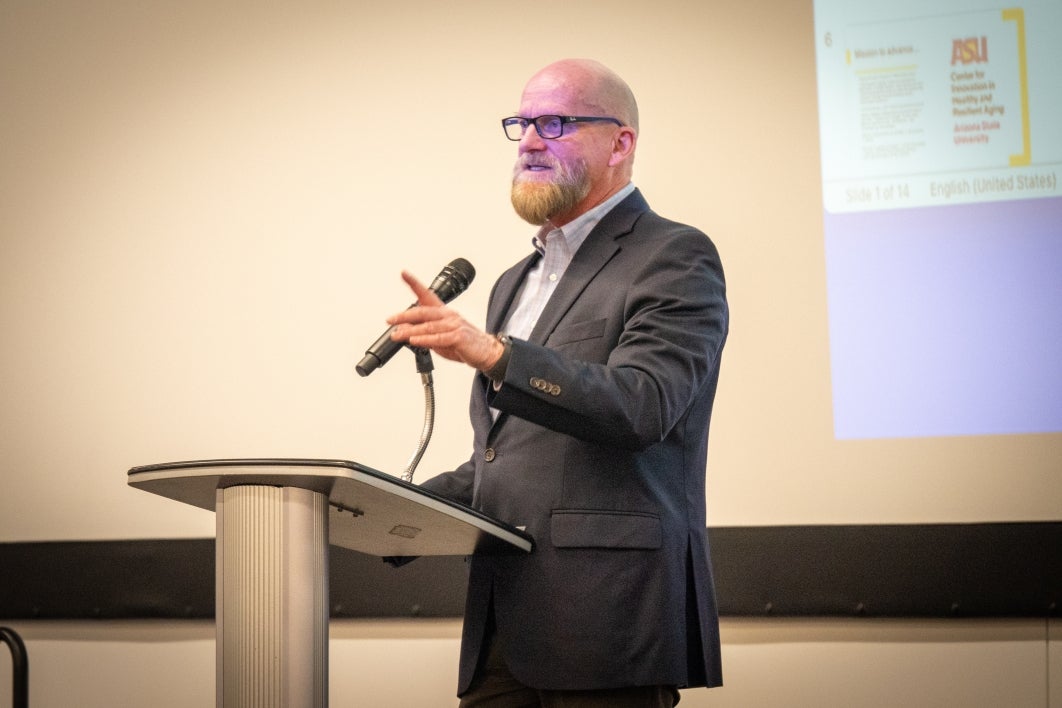ASU aging center celebrates 4th anniversary, looks ahead

The Center for Innovation in Healthy and Resilient Aging recently celebrated its fourth anniversary with researchers and community members. Photo by Brandon Nazari
Communities across Arizona, the nation and the world all face both similar challenges and unique opportunities regarding aging populations. Around 2030, there will be more people over the age of 65 than under the age of 18 in the U.S., a historical first.
“We’re living longer. There is a whole third of life that many people may experience after retirement and we need to find ways to maximize that quality of life for them and their families so they can enjoy it for as long as possible,” said David W. Coon, director of Arizona State University's Center for Innovation in Healthy and Resilient Aging.
Researchers in the center, as it’s known, are doing exactly that — and recently they celebrated how far they’ve come since its launch in 2019 with an event hosted at ASU’s Edson College of Nursing and Health Innovation, where Coon is also the associate dean for research and a professor.
“We’re quite new, and a lot of our activities happened during COVID, but we still managed to grow from just a small number of us who are really focused on doing research in aging to over 15 active researchers in aging conducting all types of dynamic work,” Coon said.
Edson College Dean Judith Karshmer kicked off the event, welcoming attendees who joined both in person and online. She emphasized the critical need for this research and applauded all those involved with the center.
“The faculty and students' work in CIHRA is nothing short of remarkable, and this is really only the beginning. Of course, this wouldn’t be possible without our wonderful partners and the community who have embraced these efforts by sharing best practices and volunteering for studies and the leadership of center Director David Coon,” said Karshmer.
Several current faculty funded by the National Institute on Aging explore resilience factors associated with cognitive aging among Black midlife and older adults, the role of the environment on cognitive aging among Mexican American and Mexican older adults, and the role of exercise as well as care values in enhancing the quality of life for people in the early stages of cognitive decline. A cooperative agreement with the National Endowment for the Arts brings together community partners and faculty to investigate the impact of the arts on family caregiving populations.
Center Director David Coon speaks to the audience about the ongoing projects happening at the center during the anniversary celebration. Photo by Brandon Nazari
The center's faculty also just published an article in the Journal of Aging and Environment in partnership with Lindsey Beagley, director of Lifelong University Engagement, about partnering with residents living in Mirabella at ASU.
“These aging experts and scholars have a really valuable role for us as we start to unpack what it means to get older. What does an 80-year-old look like now that we’re living to be 100 years old? That’s why CIHRA is really on the forefront of this, because they’re the ones investigating what the future looks like for the life span,” Beagley said.
The center's faculty and its community partners are doing it from an interdisciplinary, interprofessional perspective, pulling together researchers of all different backgrounds to examine various aspects of aging — from promoting emotional well-being and quality of life among a variety of populations and actively engaging underserved communities to also addressing the needs of family caregivers of older adults that are often experiencing stress and distress.
The center is leveraging the full research capabilities of ASU toward this unprecedented challenge and opportunity.
So what’s next? Coon says they have a rare opportunity to address a key area that is missing from the literature by tying interventions across multiple levels.
“Many people work with individuals, or they work with a couple or a family; some people work with communities or a health system while others work in policymaking. So how do we take our best learnings from all of those different levels and maximize success by weaving those together for greater impact and better outcomes? That is an important direction we’re moving toward.”
More Health and medicine

College of Health Solutions launches first-of-its-kind diagnostics industry partnership to train the workforce of tomorrow
From 2007 to 2022, cytotechnology certification examinees diminished from 246 to 109 per year. With only 19 programs in the…

ASU's Roybal Center aims to give older adults experiencing cognitive decline more independence
For older people living alone and suffering from cognitive decline, life can be an unsettling and sometimes scary experience.…

Dynamic data duo advances health research
The latest health research promises futuristic treatments, from cancer vaccines to bioengineered organs for transplants…


